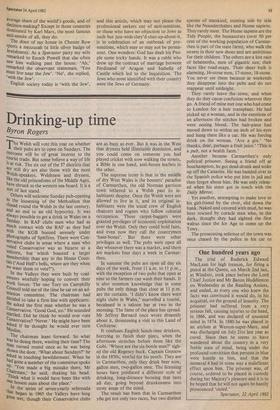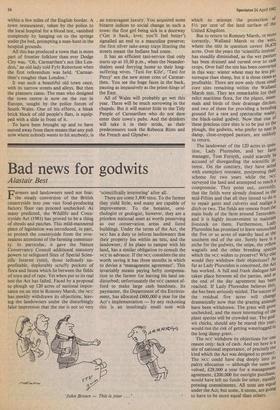Drinking-up time
Byron Rogers
The Welsh will vote this year on whether their pubs are to open on Sundays. The outcome will be of great interest to the tourist trade. But some believe a way of life Is at risk. The six out of the 37 districts that are still dry are also those with the most Welsh-speakers. Welshness and dryness, like the old princedoms of the Middle Ages, have shrunk to the western sea-board. It is a sort of last stand, Others will welcome Sunday pub-opening as the loosening of the Methodism that Closed round the Welsh in the last century, and an end to an old hypocrisy. It was always possible to get a drink in Wales on a Sunday. In RAF clubs men who had as Much contact with the RAF as they had with the KGB boozed serenely under Photographs of Spitfires. There were Con- servative clubs in areas where a man who voted Conservative was as bizarre as a unicorn, but which boasted a larger membership than any in the Home Coun- ties ('And Hell's bells, where are they when we want them to vote?'). In the Valleys they were built by coal- owners wistfully hoping to convert their work forces. The one Tory on Caerphilly Council told me of the time he sat on an ad- Mission committee, The chairman had decided to take a firm line with applicants. Re asked the first man whether he was a Conservative. 'Good God, no.' He sounded startled. Did he think he would ever vote Conservative? 'Never.' He might have been asked if he thought he would ever turn Muslim.
The chairman leant forward. So what was he doing there, wasting their time? The Man turned round once as he was being shown the door. 'What about Sundays?' he asked in touching bewilderment'. When he had gone a member of the committee spoke Chairman,' 'You made a big mistake there, Mr `-,,,haman,' he said, shaking his head. think what it would have been like with one honest man about the place.'
In the series of seven-yearly referenda that began in 1965 the Valleys have long Bone wet, though their Conservative clubs are as busy as ever. But it was in the West that dryness held illimitable dominion, and you could come on someone you had played cricket with now walking the streets, a Bible in one hand, anti-booze leaflets in the other.
The supreme irony is that in the middle of dry West Wales is the boozers' paradise of Carmarthen, the old Norman garrison town tethered to a Welsh past its in- habitants despise. Once the Welsh were not allowed to live in it, and its original in- habitants were the usual crew of English chancers and rogues who follow colonial occupation. These carpet-baggers were granted privileges of economic exploitation over the Welsh. Only they could hold fairs, and even now they call the countrymen `hanA)ones'. But there were other privileges as well. The pubs were open all day whenever there was a market, and there are markets four days a week in Carmar- then.
In summer the pubs are open all day six days of the week, from 11 a.m. to 11 p.m., with the exception of two pubs that open at nine so the farmers can wash their hands. It is also common knowledge that in some pubs the only things that close at 11 p.m. are the curtains. 'I didn't know there were night clubs in Wales,' marvelled a tourist, becalmed in a saloon bar at two in the morning. The fame of the place has spread. Mr Jeffrey Bernard once wrote dreamily about it, threatening a visit to this Land of Cockayne.
It confuses English lunch-time drinkers, hurrying to finish their pints, when the afternoon stretches before them like the Gobi. 'Where are the six-bottle men?' sigh- ed the old Regency buck, Captain Gronow in the 1850s, wistful for his youth. They are in Carmarthen, only they drink beer now, gallon men, two-gallon men. The licensing hours have produced a different style of drinking, long-distance boozing that lasts all day, going beyond drunkenness into stony areas of the mind.
The result has been that in Carmarthen ydu get not only two races, but two distinct species of mankind, existing side by side like the Neanderthalers and Homo sapiens. They rarely meet. The Home sapiens are the Tidy People, the bureaucrats (over 50 per cent of the working population of Carmar- then is part of the state farm), who walk the streets in their new shoes and are ambitious for their children. The others are a lost race of behemoths, men of gigantic size, their faces like road-maps. Their sheer bulk is alarming, 16-stone men, 17-stone, 18-stone. You never see them because at weekends they disappear into the pubs and do not reappear until midnight.
They rarely leave the town, and when they do they cause confusion wherever they go. A friend of mine met one who had come to London for a hair transplant. He had picked up a woman, and in the exertions of an afternoon the stitches had broken and were oozing blood. The hair-piece had moved down to within an inch of his eyes and hung there like a cat. He was forcing drink on the woman. 'Ave a gin.' No thanks, dear, perhaps a fruit juice.' 'This is a pub, not a health farm.'
Another became Carmarthen's only political prisoner. Seeing a friend off at Southampton, he got dead-drunk and woke up off the Canaries. He was handed over to the Spanish police who put him in jail and then forgot about him. He was only releas- ed when his sister got in touch with the Daily Mirror.
Yet another, attempting to make love to his girl-friend by the river, slid down the bank. Naked and covered with mud, he was later rescued by coracle men who, in the dark, thought they had sighted the first walrus since the Ice Age to come up the Towy.
The prosecuting solicitor of the town was once chased by the police in his car to within a few miles of the English border. A town restaurateur, taken by the police to the local hospital for a blood test, vanished' completely by hanging on to the springs under the bed, prompting a man-hunt in the hospital grounds.
All this has produced a town that is more part of frontier folklore than ever Dodge City was. `Oh, Carmarthen's not like Lon- don,' an old lady told Fyfe Robertson when the first referendum was held. 'Carmar- then's rougher than London.'
It was such a beautiful old town once, with its narrow streets and alleys. But then the planners came. The man who designed the town centre is now on the run in Europe, sought by the police forces of South Wales. One of his efforts, a bleak brick block of old people's flats, is equip- ped with a slide in front of it.
To have been brought up and to have moved away from there means that any pub now where nobody wants to hit anybody, is an extravagant luxury. You acquired some -bizarre indices to social change in such a town: the first girl being sick in a doorway Net it back, love; you'll feel better') signalled an end to a masculine preserve; the first silver take-away trays littering the streets meant the Indians had come.
It has an efficient taxi-service that only starts up at 10.30 p.m., when the Neander- thalers need ferrying home to their long- suffering wives. 'Taxi for Kife', 'Taxi for Percy' are the new street cries of Carmar- then. You see the huge faces in the back, passing as impassively as the priest-kings of the East.
All of Wales will probably go wet this year. There will be much sorrowing in the chapels. But it will matter little to the Tidy People of Carmarthen who do not dare enter their town's pubs. And the drinkers will take it in their stride, as their predecesssors took the Rebecca Riots and the French and Glyndwr.







































 Previous page
Previous page